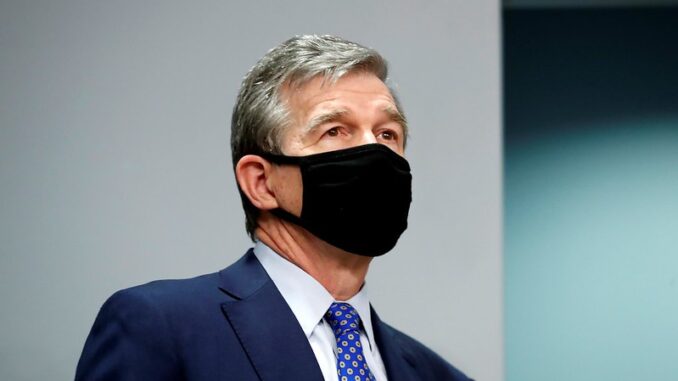
RALEIGH — In the late afternoon of Feb. 24, Democratic Gov. Roy Cooper vetoed Senate Bill 173 (Free the Smiles Act). The bill would have given parents back the power to decide whether or not to mask their children in public school settings.
In his veto message, the governor said he has “encouraged local boards to lift mask mandates” and that “they are doing across the state with the advice of health officials who see that COVID metrics are declining and vaccinations are increasing.”
This is Cooper’s 71st veto as governor. He now holds 67% (71 of 106) of all vetoes issued by NC Governors.
Cooper’s veto message also said the bill was “passed for political purposes” and reiterated previous remarks that people – in this case, parents – should not be able to “pick and choose” what health rules they follow.
“Passing laws for political purposes that encourage people to pick and choose which health rules they want to follow is dangerous and could tie the hands of public health officials in the future,” wrote Cooper.
At a Feb. 17 COVID media briefing, Cooper characterized the General Assembly’s activities to advance the bill as “frantic.”
“I know they are looking at something today and they are very frantic about it,” Cooper said when asked if he would veto Senate Bill 173. “From what I know about it, I have concerns that it is unwise and irresponsible. I mean, are we going to let people pick and choose which public health rules they are going to follow?”
“I am disappointed that Governor Cooper has vetoed this common-sense bill,” North Carolina House Speaker Tim Moore (R-Kings Mountain) said in a statement. “All health care decisions for our students belong with their parents, not with politicians or bureaucrats.”
“Actions speak louder than words, and the governor should do more than ‘encourage’ schools to lift their mask mandates. Return this decision back to parents,” said Moore.
Moore’s communications director Demi Dowdy tells North State Journal that the House Speaker will continue to put pressure on government officials to act.
In a tweet, Moore said, “This isn’t over. Looking forward to overriding @NC_Governor’s veto and returning this decision to parents, where it belongs.”
The bill passed the House with enough votes for a veto-proof majority. In the Senate, however, only two Democrats voted to pass the act with Republicans, Sen. Kirk deViere (D-Cumberland) and Sen. Ben Clark (D-Cumberland).
The vast majority of North Carolina’s public school districts have moved or seem to be in the process of considering a move to mask-optional policies.
At the end of January, out of the state’s 115 school districts, only 44 districts had chosen to go mask optional whereas 71 were still requiring a mask. As of Feb. 25, the number of mask-optional districts rose to 97. The remaining 18 mask-required districts all have upcoming meetings on the matter within the next two weeks.
Orange County is not included in the mask-optional total as its school board has tied dropping masks in schools to whenever the county decides to lift its mask mandate. Last week, the county decided to keep their mandate in place.
Both of the state’s two largest districts, Wake County Public Schools (WCPSS) and Charlotte-Mecklenburg Public Schools (CMS), voted to make masking optional for all students, staff, and visitors as of March 7, the same day the N.C. Department of Health and Human Services will update the StrongSchools NC toolkit.
Unlike CMS, WCPSS chose to allow student-athletes to go mask optional effective immediately and made masks optional for all other extracurricular activities after 5 p.m. Feb. 25.
Due to the Centers for Disease Control’s transportation order, all districts voted to continue to require masks on school buses and transportation, but that is about to change.
As of Feb. 25, the Centers for Disease Control (CDC) has rescinded that transportation requirement and altered its masking recommendations.
The StrongSchools NC toolkit has based its guidance off of the CDC’s transmission definitions. The CDC’s latest update is not much of a change, but its new Community Levels system could create a situation where citizens and children are mask free one day and then required to mask up the next.
CDC Director Rochelle Walensky has rolled out a system called “COVID-19 Community Levels” that have three tiers of transmission: low, medium, and high. Under the high level, the CDC recommends masks be worn indoors, including in schools.



